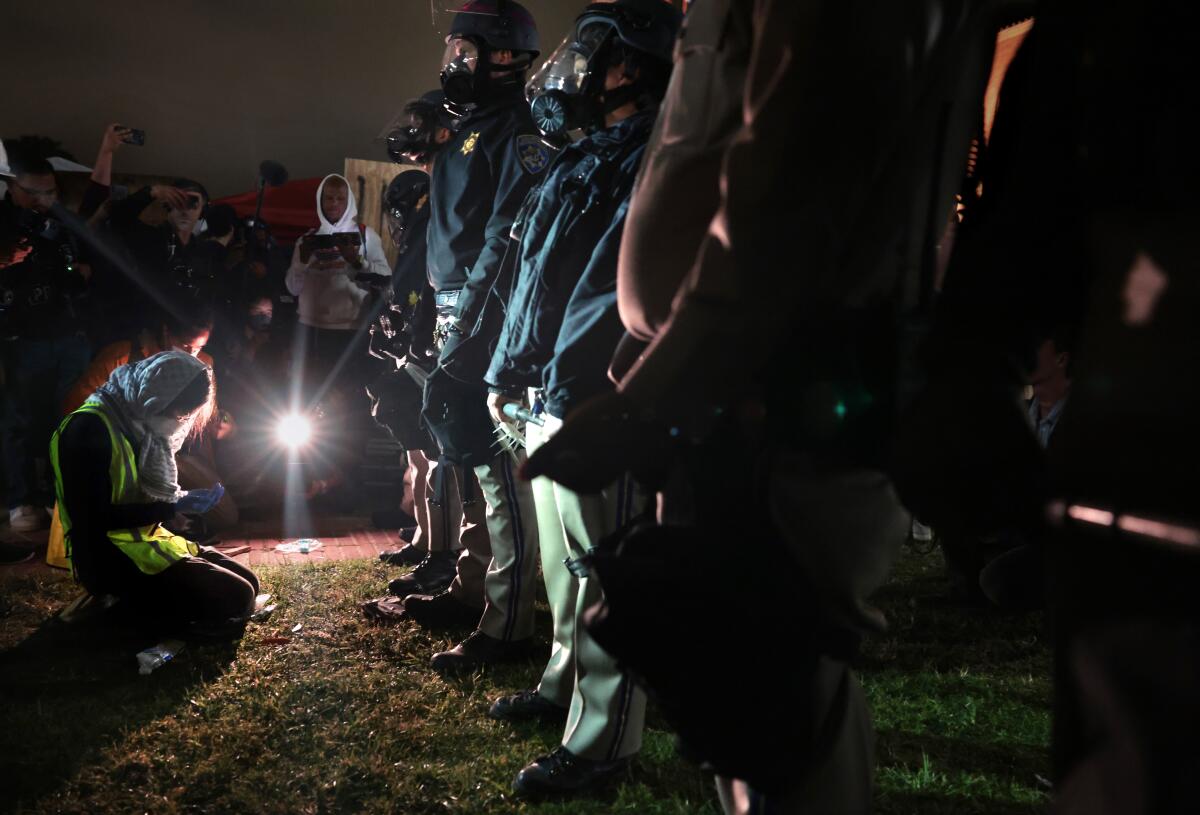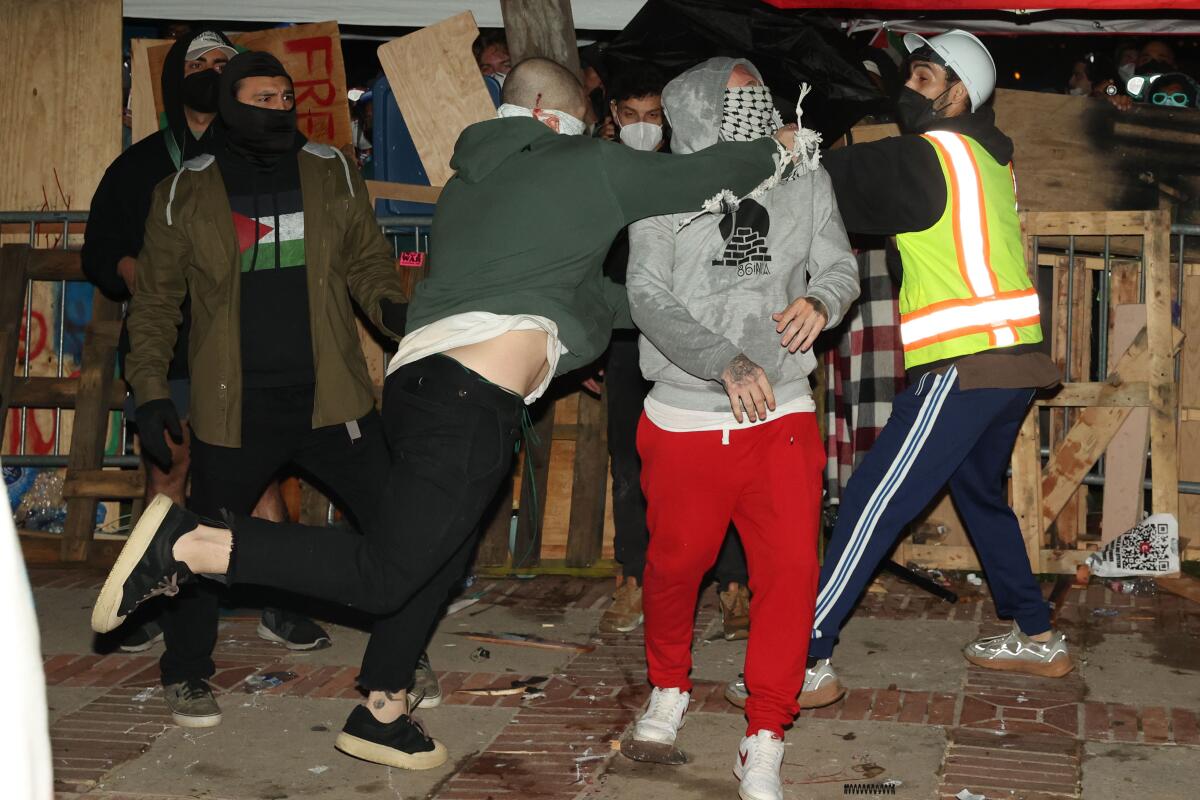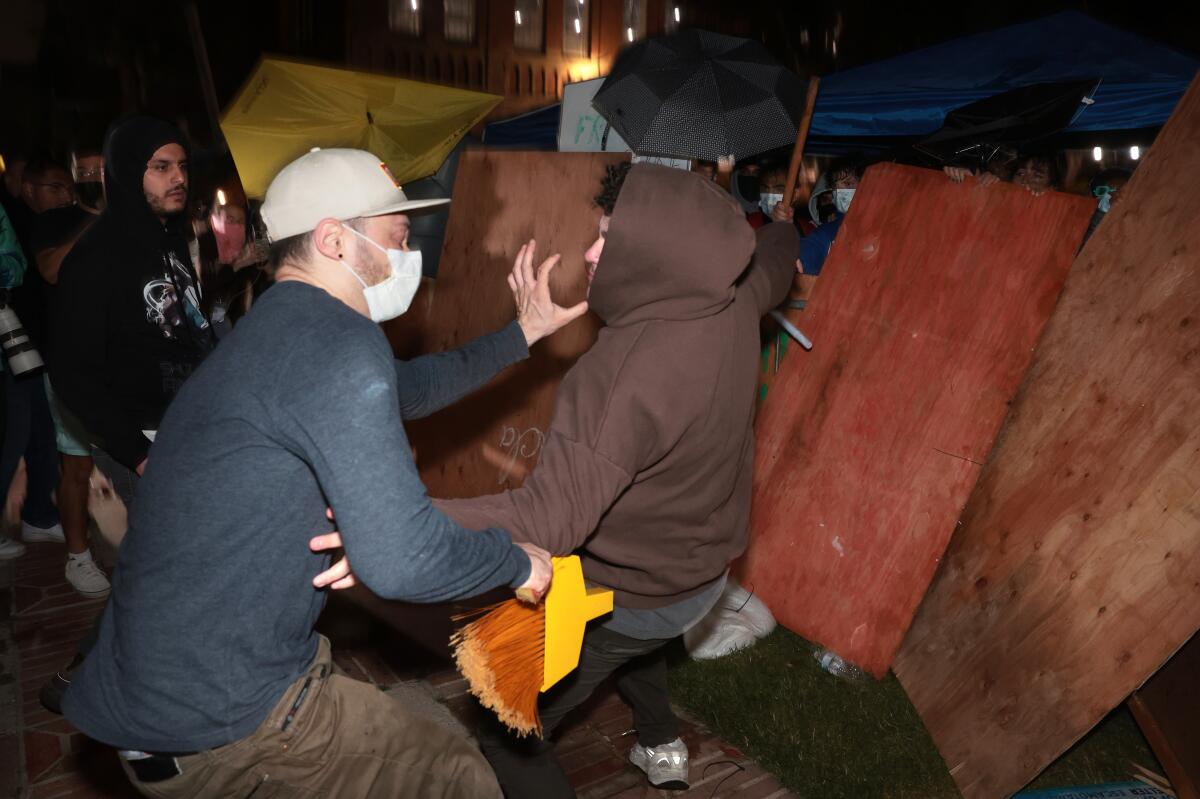Mace, green lasers, screeching soundtracks: Inside the UCLA encampment on a night of violence

- Share via
The noise — unsettling and dissonant — has been a constant inside the barricaded pro-Palestinian encampment at UCLA.
Soon after protesters, most of them students at the Westwood campus, pitched tents on Dickson Court on April 25, pro-Israel counterdemonstrators showed up with megaphones. Some shouted racist, homophobic and anti-Islamic slurs, according to campers interviewed.
They set up a giant video screen near the camp that played and replayed videos of Hamas militants. They broadcast a running torrent of loud, disturbing sounds over a stereo — an eagle screeching, a child crying — and blasted a Hebrew rendition of the song “Baby Shark” on repeat, late at night, so that campers could not sleep.
They returned night after night.

Inside the encampment, pro-Palestinian protesters, who occupied scores of tents on the grassy expanse, said they tried to maintain a tranquil space during the daylight hours when they felt some sense of control. They led Islamic prayers, observed Shabbat and hosted grief circles that included breath work and trauma therapy.
“It’s still an emotional, heavy space, but it’s also a very open, welcoming and loving space,” said Marie, a 28-year-old graduate student who, like many protesters interviewed, declined to provide her full name because she feared for her safety, physically and online. “Unfortunately, we experience the harassment and the terrorizing at night, which can be really upsetting.”
On Tuesday night, Dickson Court exploded into savagery and chaos. A large, mostly male crowd of masked counterdemonstrators tried to break into the encampment, ripping down wood and metal barriers, spraying bear mace, igniting stink bombs and tossing fireworks near the camp perimeter — and in at least one case inside the camp.
They aimed their green lasers at camper’s faces, prompting shouts of, “Shield your eyes!”
“They attacked us from physical and psychological fronts,” said Mona, a third-year student who also declined to provide her last name. “The outside aggressors have been working hard to create a harsh environment and make us feel unsafe.”

After Tuesday’s late-night melee — and a slow campus response that a spokesperson for Gov. Gavin Newsom’s office called “unacceptable” — the encampment remained. And the pro-Palestinian protesters, who are demanding divestment from Israel and an end to the country’s military actions in Gaza, were defiant.
Kaia Shah, 23, a postgraduate researcher who has acted as a spokesperson for the encampment, said demonstrators got notice Tuesday from a university liaison that the encampment was unlawful and that students who continued to occupy the space could face suspension or expulsion.
Nonetheless, she said, “We plan on staying here until we get UCLA to divest.”
Shah described the scene Tuesday night as “violent and terrifying chaos,” and said her throat burned from inhaling all the mace in the air. She and another female demonstrator said some of the counterprotesters threatened to sexually assault women inside the encampment.
Shah said that, at one point, she saw police cars — it was unclear from which agency — pull up, turn around in a circle and leave. “The cops came and left as we were getting violently attacked by the Zionists,” she said.
Dueling chants rang out.

From inside the camp, they shouted: “Free, free Palestine!” and “Hold the line for Palestine!”
Outside, some counterdemonstrators screamed: “Second Nakba!” referring to the mass displacement and dispossession of Palestinians during the 1948 Arab-Israeli War. Others chanted: “USA! USA!”
As the violence unfolded, Citlali, a 25-year-old from Santa Ana who works for the organization Youth Organize! California and declined to provide her last name, said she frantically texted her younger brother, a student who was inside the encampment.
“Hey can you answer? Are you okay?? It’s okay to retreat,” she texted.
She said her brother was sprayed with bear mace and left the encampment Wednesday morning to wash up in his dorm room. “It’s gut-wrenching,” Citlali said. “I couldn’t sleep until 4 a.m. when he texted me that he was OK.”
After sunrise Wednesday, the UCLA chapter of Students for Justice in Palestine posted a list of their needs at the encampment: gas masks, skater helmets, shields, “super bright flashlights with strobe,” EpiPens, inhalers, hot lunches, gluten-free food.
Hours of violence that unfolded overnight at a pro-Palestinian encampment set up on UCLA’s campus prompted administrators to cancel classes on Wednesday and has triggered questions about authorities’ response.
Campus security teams, faculty members and California Highway Patrol officers guarded entrances to the encampment Wednesday morning.
Hannah Appel, an assistant professor of anthropology, stood at one entrance, where people dropped off medical supplies, face masks and water bottles. Only students with wrist bands indicating they were previously in the encampment and those who had someone on the inside vouching for them were allowed to enter, Appel said.
“Because of the escalated violence last night, we have to be very vigilant and careful about who can come in and out,” Appel said, before stepping aside to let a student squeeze through the barricades.
Vanessa Muros, an archaeology researcher at UCLA, showed up outside the encampment with finger cymbals, maracas and a tambourine. She said a call was sent out to students and faculty who participated in a band during a 2022 UC academic workers’ strike. The musicians were asked to help boost morale at the encampment.
“Apparently morale is low in there, and playing music or just making noise will help rally people together,” she said.

Muros has worked at UCLA for 19 years and said she has never seen such mayhem on campus. “It’s upsetting, and I feel like the administration will blame the chaos on the students who have been peacefully protesting,” she said.
Renee Tajima-Peña, a senior faculty member, stood in a line outside Royce Hall to make a donation for the protesters: solar phone chargers, a poncho, some respirators.
“The story has been that all these students are irresponsible or causing problems,” she said. “I teach here and this encampment has been beautiful.”
Tajima-Peña was on campus Sunday when campers tussled with pro-Israel counterdemonstrators, who, she said, spit at students and shouted racial slurs.
“I was shoved by a guy a foot taller than me,” she said. “Another woman, a colleague of mine, also got shoved by some guy.
“But the students — they were so stoic. They didn’t want to engage and didn’t want to escalate. I was so proud.”
Times staff writer Safi Nazzal contributed to this report.
More to Read
Sign up for Essential California
The most important California stories and recommendations in your inbox every morning.
You may occasionally receive promotional content from the Los Angeles Times.















